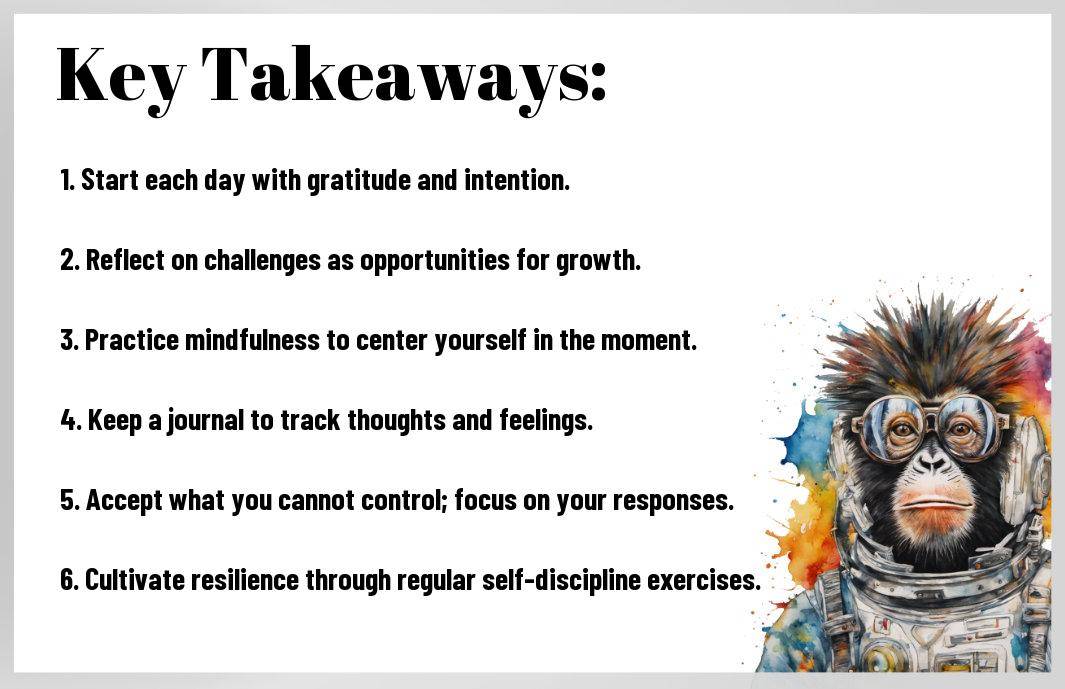Practices rooted in Stoicism have the power to transform our daily lives, offering us valuable tools to navigate challenges with grace and resilience. In this blog post, I’ll share some of my favorite Stoic practices that you can easily incorporate into your routine in 2025. By embracing these principles, I believe you’ll find greater clarity and peace of mind, even in the midst of uncertainty. Let’s explore how a few simple adjustments can lead to profound changes in your perspective and well-being!

Key Takeaways:
- Meditation: Incorporate short sessions of meditation to enhance self-awareness and mental clarity.
- Negative Visualization: Practice imagining worst-case scenarios to cultivate appreciation for the present and reduce fear of loss.
- Gratitude Journaling: Maintain a daily journal to record things you are thankful for, which helps to shift focus to positive aspects of life.
- Mindfulness: Engage in mindful practices during daily activities to foster presence and reduce stress.
- Reflection: Allocate time each day for self-reflection to evaluate your actions and emotions, promoting personal growth.
- Emotional Detachment: Work on observing your emotions without being overwhelmed by them, leading to better decision-making.
- Simplicity: Adopt a lifestyle focused on simplicity, which encourages prioritization of what truly matters and reduces unnecessary stress.

Embracing Mindfulness
Start Your Day with Gratitude
Below, I want to share how starting my day with gratitude has transformed my outlook on life. Every morning, I take a few moments to reflect on three things I’m grateful for. It could be something as simple as enjoying a warm cup of coffee or the loving support of family and friends. By bringing my attention to these positive aspects of my life right at the start of the day, I set an uplifting tone that influences my mood and decisions throughout the day. This practice has been instrumental in helping me cultivate a more positive mindset, and I encourage you to give it a try!
Practice Presence Throughout the Day
One of the most beneficial aspects of embracing mindfulness, for me, has been the practice of being present throughout the day. This means truly immersing myself in whatever I am doing at any given moment. Whether I’m working, spending time with loved ones, or even enjoying a leisurely walk, I focus all my attention on the task at hand. By minimizing distractions—like my phone or racing thoughts—I can appreciate life’s little moments more fully and find joy even in mundane activities.
With this practice, I find that I’m able to engage more deeply with people and experiences. I’ve noticed that being present helps reduce anxiety and enhances my overall sense of well-being. You might notice a similar change in your own life when you commit to being truly “in the moment.” It’s a beautiful reminder that life unfolds in the here and now, rather than in the past or future. So why not take a few minutes today to immerse yourself fully in whatever you choose to do? You’ll be surprised at how enriched your experiences can become!

Journaling for Reflection
If you’re looking for a simple yet powerful way to practice Stoicism daily, journaling may be the perfect fit for you. It serves as an opportunity to reflect on your thoughts, emotions, and actions, offering insights into your inner world. By carving out a few minutes each day to write, you can cultivate mindfulness and develop a deeper understanding of how you respond to life’s challenges. It’s all about creating a space where you can explore your experiences without judgment and gain clarity on your personal growth journey.
Evening Reflections
Before settling into a well-deserved rest, I find it incredibly beneficial to take a moment for evening reflections. This could mean identifying what went well during the day or areas where I felt challenged. I often note any encounters that triggered strong reactions, allowing me to analyze my responses and consider how I might handle similar situations more effectively in the future. By doing so, I cultivate a perspective balanced with gratitude and self-awareness, which is imperative for my ongoing development.
Learning from Adversity
One of the core teachings of Stoicism is that adversity is not just a stumbling block but a stepping stone for personal growth. Each challenge I face offers an invaluable lesson, reminding me that discomfort and struggle are integral parts of life. When I record these experiences in my journal, I can assess how I responded to difficulties, recognizing both my strengths and areas for improvement. This practice not only fosters resilience but also empowers me to approach future obstacles with a more balanced mindset.
Hence, by reflecting on adversity in my journal, I can uncover patterns in my behavior and thought processes during hard times. It’s fascinating to see how my perspective shifts as I analyze past difficulties—what once seemed overwhelming now feels like a source of wisdom. Each entry serves as a reminder that growth often resides on the other side of discomfort, encouraging me to embrace challenges rather than shy away from them. Through this process, I not only learn from my experiences but also cultivate a more Stoic attitude, preparing myself for whatever life throws my way.
Practicing Acceptance
Not everything in life goes according to plan, and practicing acceptance can help us navigate those unexpected turns with grace. It’s about acknowledging that some circumstances are beyond my control and finding peace in that realization. By accepting situations as they are, I can respond with a clearer mind and a calmer spirit, allowing me to focus on what truly matters.
Letting Go of Control
One of the first steps in practicing acceptance is learning to let go of control over outcomes I cannot influence. I often find myself worrying about how things will turn out—whether it’s a project at work, a relationship, or even just my daily schedule. However, when I embrace the idea that I can’t control everything, I free myself from the burden of constant anxiety. The truth is, focusing on controlling what’s outside my reach only detracts from the energy I could spend on what I can change.
Embracing Challenges
An important part of practicing acceptance is shifting my perspective on challenges. Instead of viewing obstacles as setbacks, I can see them as opportunities for growth and learning. Each challenge presents a chance to expand my resilience and adaptability. When I face difficulties head-on, I realize I am capable of much more than I initially believed. Accepting that challenges are a natural part of life can transform my mindset and empower me to tackle whatever comes my way.
Plus, when I embrace challenges with an open heart, I start to cultivate a sense of gratitude for the lessons they bring. I’ve learned that overcoming difficulties often leads to personal development, enhanced skills, and deeper connections with others. Instead of shying away from what feels uncomfortable, I welcome it, knowing that each experience—good or bad—adds richness to my journey.
Developing Resilience
Despite the challenges we face daily, cultivating resilience has become a vital skill in our fast-paced world. This practice not only helps me bounce back from setbacks but also allows me to maintain a positive mindset even in tough situations. Adopting a Stoic approach encourages me to recognize what is outside of my control and focus on my reactions, enhancing my ability to weather life’s storms with grace and composure.
Building Mental Toughness
Among the many techniques I’ve found effective in building mental toughness, reflection plays an important role. By regularly assessing my thoughts and responses to adversity, I can identify patterns that both help and hinder my progress. Engaging in practices like journaling or meditative thought can nurture this resilience; it allows me to clarify my values and adapt my outlook to better cope with life’s unpredictabilities.
Celebrating Small Victories
Among the simplest yet most rewarding practices I’ve adopted is the celebration of small victories. By acknowledging the tiny steps that lead to my larger goals, I create a sense of progress and motivation. It could be as simple as completing a task I’ve been procrastinating on or sticking to my daily routine. Celebrating these moments not only boosts my spirits but reinforces the importance of persistence and effort in the face of life’s challenges.
Further to this idea, I’ve learned that taking a moment to genuinely celebrate each small victory can enhance my resilience. Whether it’s treating myself to something I enjoy, sharing my achievements with a friend, or even just reflecting on what it took to get there, these actions reinforce my growth mindset. When I focus on the wins, no matter how minor they may seem, I strengthen my belief in my ability to overcome obstacles and maintain a positive trajectory in life.
Cultivating Virtue
For those of us looking to infuse our daily lives with meaning in 2025, cultivating virtue is a powerful practice that can help shape our character and decisions. By aligning our actions with our values, we can create a life filled with purpose and integrity. Adopting a Stoic perspective encourages us to focus on what we can control—our virtues—while accepting the things we cannot change. This realization opens the door to living authentically and making choices that resonate with who we truly are.
Defining Your Core Values
An important first step in cultivating virtue is to define your core values. What principles guide your actions and decisions? Take some time to reflect on what matters most to you—be it honesty, compassion, courage, or something else entirely. By identifying these values, you create a personal compass that can help steer you toward a life that aligns with your beliefs. I find that writing down my values and revisiting them regularly keeps me grounded and focused on what truly matters.
Daily Acts of Kindness
An effective way to embody your core values is through daily acts of kindness. These small gestures not only contribute positively to the lives of others but also reinforce your commitment to your values. Whether it’s lending a helping hand, offering a compliment, or simply listening to someone in need, these acts allow you to practice empathy and compassion, both fundamental to Stoic practice. I like to set a goal for myself each day to perform at least one act of kindness, no matter how minor it may seem.
The beauty of daily acts of kindness lies in their ripple effect. When you extend kindness to others, you not only lift their spirits but also inspire them to pay it forward, creating a cycle of goodwill. This practice allows you to actively contribute to a more positive world while simultaneously cultivating your own virtues. I’ve noticed that even small actions—a smile to a stranger or a thank-you note to a friend—can significantly impact my mood and sense of fulfillment throughout the day.
Connecting with Nature
Many of us lead busy lives, often forgetting to pause and embrace the world around us. In 2025, consider incorporating nature into your daily routine. By grounding yourself in natural surroundings, you can find calm and perspective. The beauty of the outdoors offers a reminder of the simple joys in life and is a fantastic way to cultivate a sense of awareness, tranquility, and well-being.
Mindful Walks in Nature
Connecting with nature can be as simple as taking a mindful walk. I love to step outside, breathe in the fresh air, and let my surroundings wash over me. You can take your time, noticing the details—the rustling leaves, the colorful flowers, or the sound of birds chirping. Each of these elements invites you to engage your senses and fosters a deeper connection to the environment, reminding us to live in the moment.
Nature as a Teacher
Along my journey, I’ve found that nature offers invaluable lessons. Each season teaches me something different, whether it’s the importance of resilience during winter or the beauty of change in autumn. As I walk, I often reflect on the cycles of life that unfold around me, allowing these insights to shape my perspectives and attitudes. Nature has a way of highlighting the interconnectedness of all things, which serves as a profound reminder that I am part of something much larger.
For instance, observing how trees shed their leaves in the fall and bloom again in the spring reminds me that life is about transitions and renewal. This cyclical pattern encourages me to let go of what no longer serves me, making space for new growth and opportunities. By adopting this mindset, you can embrace change as a natural part of the journey, ultimately enriching your experience as you navigate life’s challenges.
To wrap up
Ultimately, integrating Stoic practices into my daily routine in 2025 has been a refreshing journey. By focusing on what I can control, practicing gratitude, and embracing challenges, I’ve noticed a positive shift in my mindset and overall well-being. I invite you to explore these principles as well and see how they can enhance your life. For inspiration, you can check out What 5 Simple Stoic Practices Can You Integrate in Your Daily Life.
As I continue to embrace these Stoic teachings, I find myself becoming more resilient and focused on the present moment. I encourage you to take small steps and incorporate these practices into your routine. By doing so, I believe we can create a more meaningful and fulfilling year ahead together. Let’s support each other on this path towards a more Stoic-inspired way of living!
FAQ
Q: What are some simple Stoic practices I can incorporate into my daily routine?
A: There are several Stoic practices you can easily integrate into your daily life. Start each day with a morning reflection, setting your intentions and considering the challenges you may face. Throughout the day, practice mindfulness by observing your thoughts and feelings without judgment. In the evening, engage in a review of your day, reflecting on what went well and what you could improve. Journaling can also be beneficial, allowing you to articulate your thoughts and emotions, helping you gain clarity and perspective.
Q: How can I apply Stoicism to manage stress effectively?
A: Stoicism teaches us to focus on what we can control and accept what we cannot. When faced with stress, take a moment to identify the aspects of the situation that are within your influence and those that are not. Channel your energy into addressing the controllable aspects and practice acceptance for the rest. Techniques such as deep breathing and visualization, where you imagine handling stress with calmness and composure, can further enhance your ability to manage stress through a Stoic lens.
Q: What role does gratitude play in Stoic practices?
A: Gratitude is a significant aspect of Stoicism. It encourages us to recognize and appreciate the good in our lives, promoting a positive outlook. Daily practices for cultivating gratitude can include listing things you are thankful for each evening or reflecting on moments that brought you joy or lessons learned during the day. This focus on gratitude helps to mitigate feelings of negativity and fosters resilience against adversity.
Q: Can Stoicism help improve my relationships with others?
A: Absolutely! Stoicism emphasizes empathy, understanding, and kindness. By applying Stoic principles, you can approach conflicts with patience and rationality, taking the time to understand others’ perspectives. Practicing forgiveness and seeing the humanity in those around you encourages healthier relationships. Additionally, regularly reflecting on your interactions can aid in recognizing areas for improvement, fostering personal growth and stronger connections.
Q: How do I use the Stoic concept of ‘amor fati’?
A: ‘Amor fati’, meaning ‘love of fate’, is the idea of embracing everything that happens in life, including challenges and setbacks. To practice this, adopt an attitude of acceptance towards all experiences. Instead of resisting difficulties, view them as opportunities for growth and learning. You can also engage in visualization exercises, where you imagine dealing with adverse situations positively, reinforcing a mindset that appreciates the full spectrum of life’s events.
Q: What are some Stoic resources I can explore in 2025?
A: There are various resources available for those interested in Stoicism. Classics such as Marcus Aurelius’ “Meditations”, Epictetus’ “Enchiridion”, and Seneca’s letters offer timeless wisdom. Modern authors like Ryan Holiday and Massimo Pigliucci have also published insightful books and articles that relate Stoic principles to contemporary life. Additionally, online courses, podcasts, and social media communities provide numerous engaging platforms to learn and practice Stoicism daily.
Q: How does self-discipline relate to Stoic practices?
A: Self-discipline is central to Stoic philosophy, as it empowers individuals to align their actions with their values. Practicing self-discipline involves setting clear goals and boundaries, studying your impulses, and cultivating the ability to delay gratification. Regularly engaging in exercises that challenge your willpower, such as fasting or limiting distractions, helps build resilience and promotes a life lived in accordance with your true priorities and principles.



